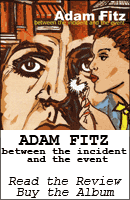Book: Indecision by Benjamin Kunkel
 Title: Indecision
Title: IndecisionAuthor: Benjamin Kunkel
ISBN: 1400063450
Publisher: Random House
Year: 2005
List Price: $21.95
Review: A lot of things have already been and will continue to be said about this book. A portrait of post-9/11 displacement and anxiety. A farce on the pharmaceutical industry. A new kind of bohemian adventure novel.
While all of those things ring true, what struck me most about Kunkel's Indecision was the bull's-eye accuracy with which it depicts the aimless twenty-something male in contemporary America. I feel that I just may be one such male, so I feel like I have every right to pass this judgment.
The book begins with twenty-eight year old Dwight B. Wilmerding, philosophy graduate and recent ex-employee of the pharmaceutical company Pfizer, on his way to Ecuador to visit an ex-lover of sorts for no particular reason.
That is just Dwight's problem. Reason. Constantly falling back on mental masturbation (as well as other forms) and philosophical pondering, Dwight can't seem to make up his mind. Even the automatic choice between coffee or tea seems impossible.
Under the influence of a new miracle drug that is supposed to aid the user in making decisions, Dwight lets the world take him where it will until the drug's effects kick in.
Along the way, Dwight travels through the jungles of Ecuador with a beautiful Dutch woman and through his memory with a new understanding of the meaning of his own life.
Traveling through South American without knowing any Spanish, leaving a girlfriend and family behind without any concern for anyone but himself and leaving decisions up to the pharmaceutical wonder in his pocket, Dwight gives the reader an inside look at what it means to be an irresponsible twenty-eight year old male. At times, it is hard to tell whether Dwight is stuck in childhood or on the cusp of a breakdown.
Though the novel falls apart at the end with tangential comedy, self absorbed not-so-cleverness, and no real relevance to the rest of the story, this itself offers further insight.
Recommended reading for any man stuck in his twenties (no matter how old you are), though anyone will be able to laugh and cringe at the flawed reasoning behind Dwight's actions.
This book might even cause you to make a few decisions of your own. I know it convinced me that I should learn to speak Spanish…quick!
Rating: 3.75 / 5
Buy one at Amazon.com!
















